How fictional band Daisy Jones the Six became a streaming success
From a popular novel to a hot new Amazon Prime Video series, Daisy Jones & the Six – a band that never existed – has become a major success across multiple platforms.
by Maria Sherman from the Chartmetric Blog
Introduction to the Fictional Band Tradition
The fictional band tradition is long and rich. In the mid-’60s, The Monkees were conceived for a sitcom of the same name, a not-so-thinly veiled parody of The Beatles, making way for The Partridge Family in the ‘70s. The ‘80s birthed The Blues Brothers and This Is Spinal Tap. Fictional bands hit critical mass in the early 2000s: Josie and the Pussycats and 2gether spoofed the apex of teen pop boy bands and girl groups while Stillwater from “Almost Famous” kept the dream of the ‘70s alive. In the current era, there’s MC Blueblood from Donald Glover’s Atlanta (portrayed by real rapper Earl Sweatshirt) and the Y2K group 4*Town from Disney’s “Turning Red.” Across genres and generations, a few faux groups developed very real and very devoted fanbases. In an era where streaming data numbers are undeniably influenced by other mediums—social media, television, film—it should come as no surprise that one of the biggest new bands of 2023 doesn’t exactly exist.
“Daisy Jones & the Six,” a 2019 novel by Taylor Jenkins Reid, was adapted into a multipart musical drama series by Amazon’s Prime Video in March 2023. The narrative follows the titular rock band as they write and record their 1976 hit album, Aurora, in the midst of heartbreak and superstardom—inspired by Rumors-era Fleetwood Mac—where the songs directly mirror the story arc of the show. The band may be a group of actors playing the part of rock ‘n’ roll folklore, but the album is very real: two days after it was released, on March 4, 2023, the “band” reached over 1 million monthly Spotify listeners. They became the first fake band to top the iTunes charts (on March 2, a day before the series premiered on Amazon), and not long afterward, became the first ever fictional band from a scripted series to hit No. 1 on the Billboard Emerging Artists chart. Capitalizing on the book’s fandom, the popularity of the series, and cultural interest in the ‘70s sounds, Daisy Jones & the Six have become one of 2023’s greatest musical success stories.
How Daisy Jones & the Six Came to Life

Like all fictional bands, the data on Daisy Jones & the Six only goes as far back as their recorded music history. On January 25, a few weeks after the Amazon show was announced, a trailer for the series was released alongside Daisy Jones’ first original track, the Laurel Canyon-esque kiss-off “Regret Me.” The single is placed prominently in the clip: it ends with Daisy Jones (Riley Keough) singing the final line, “Go ahead and regret me / But I’m beating you to it, dude” in a stadium–a wink to her bandmate Billy Dunne (Sam Claflin). The song’s lyrics differed from the ones in the novel, spurring conversation online. As soon as “Regret Me” was released, streams shot up, receiving a boost when the album dropped on March 2, when the show premiered on March 3, and when episodes were released throughout the remainder of the month.
There is also the star power of the band itself, which allowed for consistent growth and potential virality: when model-actor Suki Waterhouse, who portrayed keyboardist Karen Sirko, posted the song on TikTok, it racked up over 1.8 million views. Celebrity influence is felt behind the scenes as well: Reese Witherspoon’s media company Hello Sunshine produced the series, and another 1.8 million people have seen her tease of the song. In that regard, the audience for Daisy Jones & the Six is much broader than that of a new act—their very specific media rollouts targeted fans of the book, fans of the actors, and fans of musical adaptations of books–a pool much larger than a real new band’s listenership.
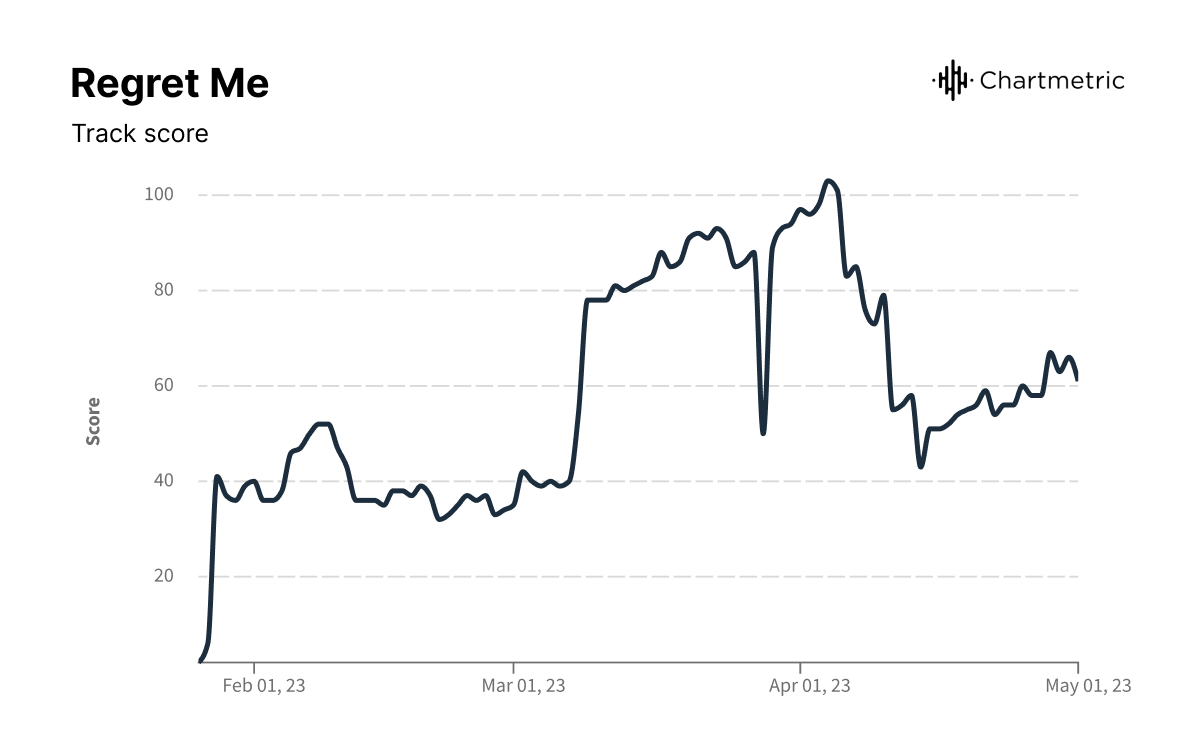
The Chartmetric score of Daisy Jones & the Six’s debut track spiked immediately when the song was released, plateaued a bit, and shot up again around the time of the Amazon series’ release and Aurora.
That trend is especially true of the album’s most popular track, “Look At Us Now (Honeycomb),” which samples the guitar riff from Fleetwood Mac’s “The Chain,” making it more than just an homage. It also plays a key role in tracing the relationship between Daisy Jones and her bandmate Billy Dunne; the song plays in both the premiere and final episodes. Released on Valentine’s Day, the track climbed steadily, exploding the month the show came out.
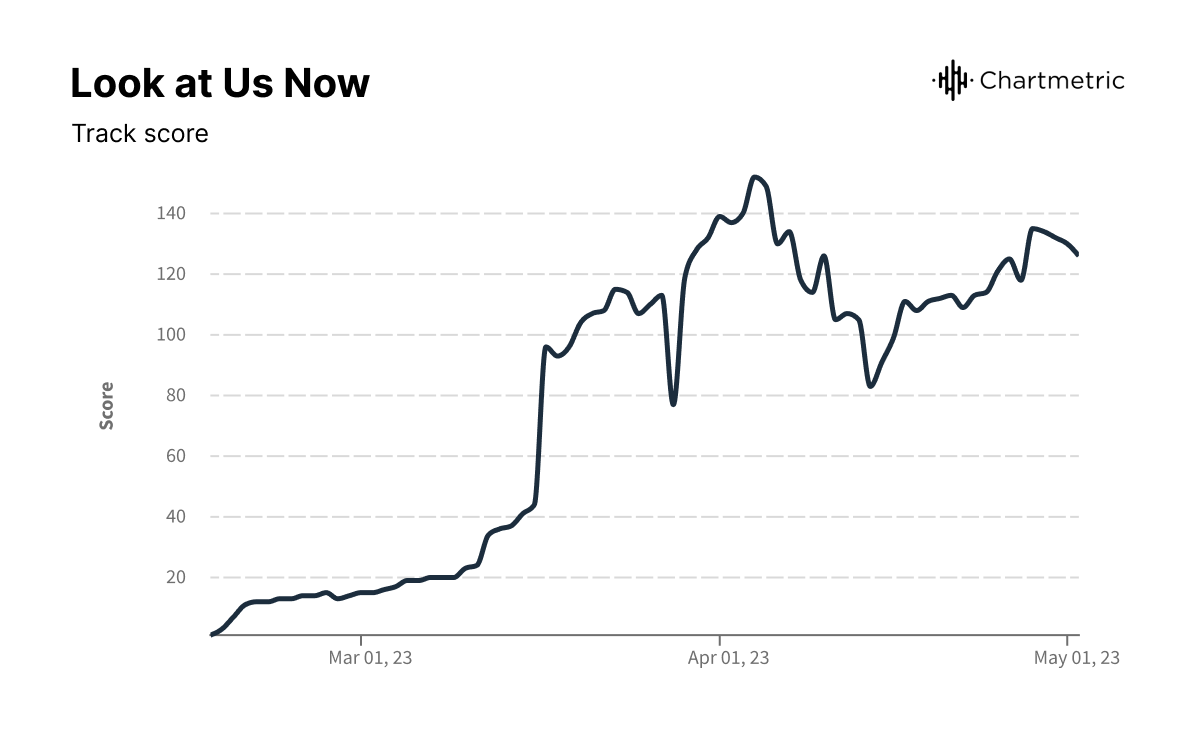
Charting the Success of Daisy Jones & the Six
In the three months since Daisy Jones & the Six have been releasing music, they’ve experienced explosive growth across platforms, climbing with each new episode drop: episodes 1 – 3 and the album release happened on March 3, episodes 4 – 6 on March 10, 7 – 8 on March 17, and the penultimate episode and the finale on March 24. On March 30, Daisy Jones & the Six released an unexpected single album,Special Gift For Our Fans, including a new track, “It Was Always You,” and a “live” recording of their performance of “Aurora” on Saturday Night Live, taken from the television show.

More explosive than their fan following is their engagement. In those three months, Daisy Jones & the Six has gone from nonexistent to exponential: as of April 12, the band boosts 3.56 million Spotify monthly listeners, 2.73 million YouTube channel views, and 2.2 million TikTok likes.
The Power of TV Syncs
Beyond the obvious allusions to Fleetwood Mac’s great rock ‘n’ roll romance and heartbreak, the music of Daisy Jones & the Six was composed to sound like some of the classic rock greats of 50 years ago. Atlantic Records teamed up with Grammy award-winning producer Blake Mills to co-write and produce the album, and he brought in collaborators Phoebe Bridgers, Marcus Mumford of Mumford and Sons, Dawes’ Taylor Goldsmith, and Jackson Browne for the band’s signature sound.
The combination has proven to be successful for the band, and interestingly, for Fleetwood Mac themselves. In fact, when the show synced a Fleetwood Mac original, “Gold Dust Woman,” the song began to climb on the streaming platforms.
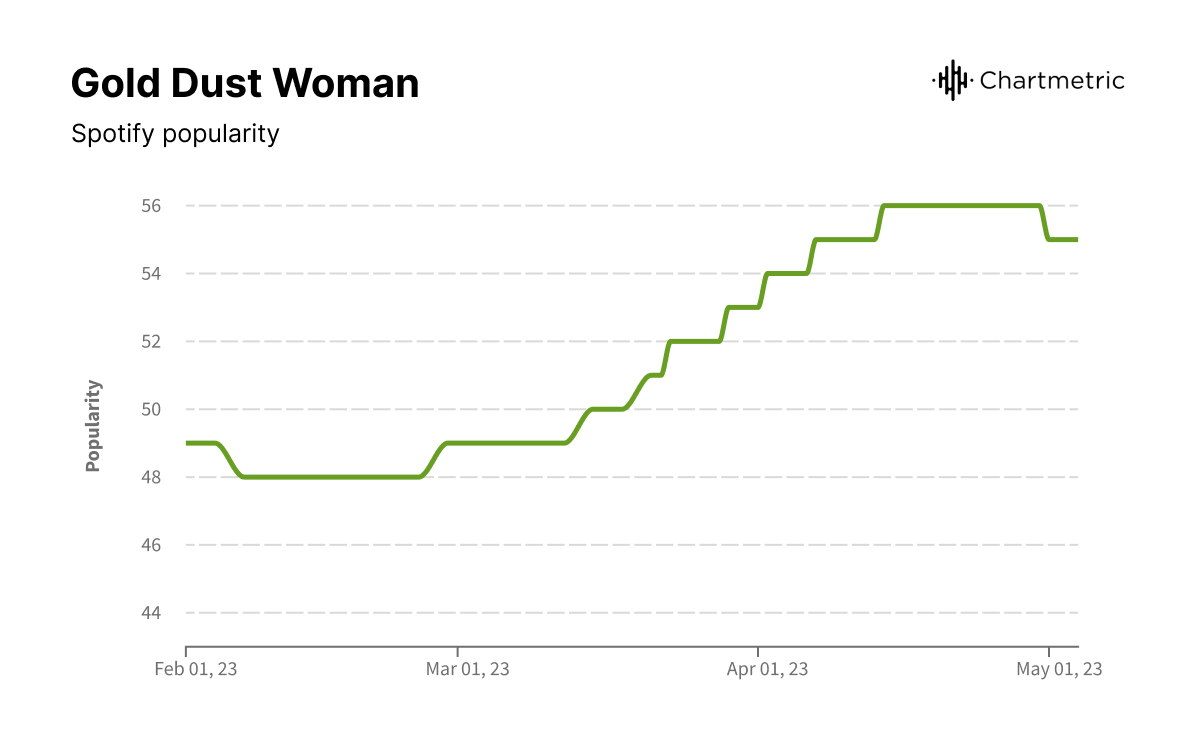
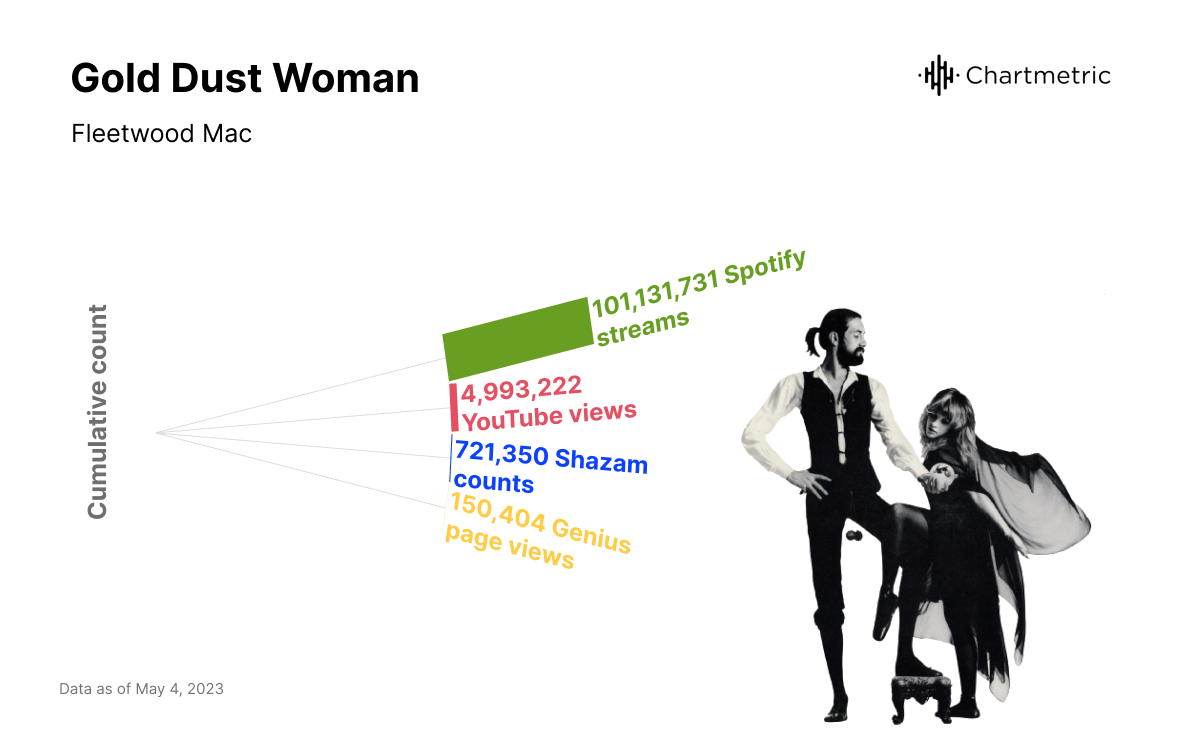
The Rise and Fall of Fictional Bands
While beloved fake bands have existed for decades now, they are still few and far between—authenticity is a prevailing metric of artistic value in pop culture, and few faux groups find their way to the top. To get a better understanding of how Daisy Jones & the Six stack up to this unique phenomenon, let’s take a look at the most recent fictional band success story: 4*Town from Disney’s “Turning Red,” an animated boy band with original songs composed by Billie Eilish and her brother and longtime collaborator, Finneas O’Connell.
When the film and soundtrack premiered on March 11, 2022, streaming numbers grew rapidly to the point that the band ranked in the top 200 artists in the world based on Chartmetric score. However, in the months that followed, their numbers quickly declined as they had no new releases or social media presence. While “Daisy Jones & the Six” is still trending because it’s only been two months since their launch, we can expect their trajectory to follow a similar path to the one of 4*Town.
One might assume that if these fake acts behaved like real bands, with an active public life and a consistent release of tour dates and singles, the data would look different: with an increase in listeners and engagement instead of a drop or a plateau.
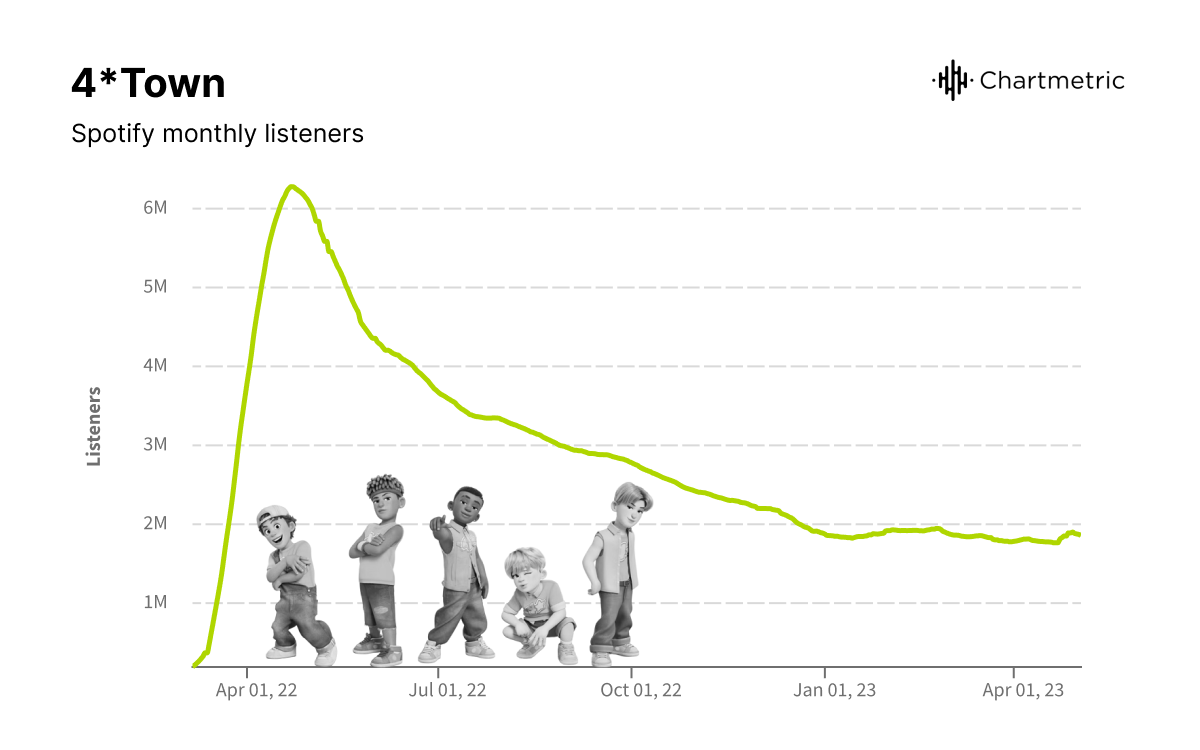
Take, for example, the brand-new K-pop girl group NewJeans. They debuted in August 2022 with immediate explosive growth but soon after, their listenership declined as they had no new releases for five months. It wasn’t until the release of their single album OMG in January 2023 that the band experience explosive growth once again and reached an all-time high of 22M+ Spotify monthly listeners the following month.
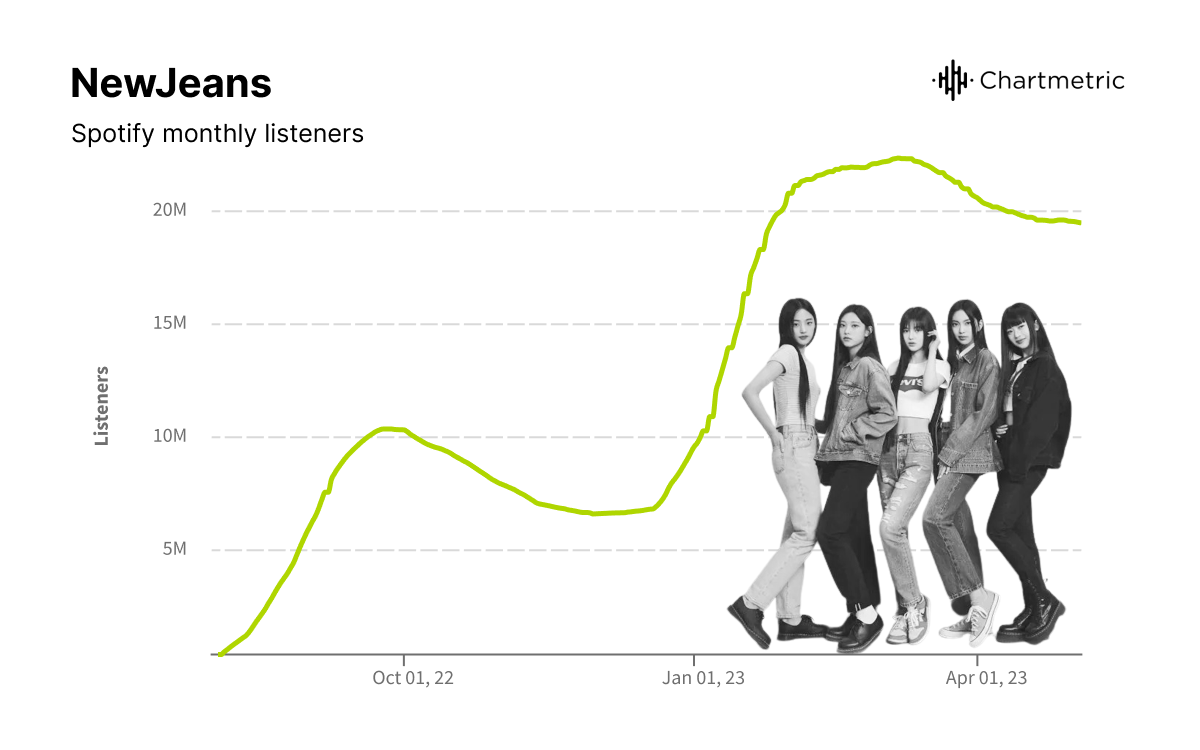
NewJean’s example shows that any hot new act can lose traction if they aren’t constantly releasing new hits during their first months in the industry. Because this is a real band that was planned to release new material eventually, they were able to recover from the drop and continue rising. However, fictional bands are bound to decline if they don’t release new material ever again.
Daisy Jones & the Six’s Place in Music History
Success and virality in music can come from the most unexpected of places—and the popularity of Daisy Jones & the Six, a band that only sort of exists, may come as a shock. But in reality, they are the direct result of a combination of factors aligning: a popular novel leading to a popular scripted television series (starring famous and beloved models and actors, supported by celebrity production companies), teaming up with hot-shot songwriters to build the biggest band of the 1970s in 2023.
I’m making a decent compensation from home $61k/week , which was astonishing under a year prior I was jobless in a horrendous economy. I was honored with these guidelines and presently it’s my obligation to show kindness and share it with Everyone,
.
.
Here is I begun————————————➤ https://goodjobs2.pages.dev/
As fans delve into the world of Daisy Jones & The Six, they not only follow their journey but also experience the emotional highs and lows that come with being part of a band. This immersive quality has resonated with audiences, drawing them in and making them feel connected to the characters and their musical journey. In addition to the engaging storyline, the article https://www.firstcomicsnews.com/how-shakespeares-work-influenced-the-development-of-the-literary-genre/ explores the profound impact of Shakespeare’s work on the development of literature. While the article is not directly related to Daisy Jones & The Six, it highlights the enduring influence of literature on various art forms, including music.